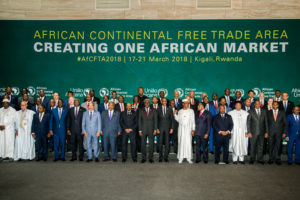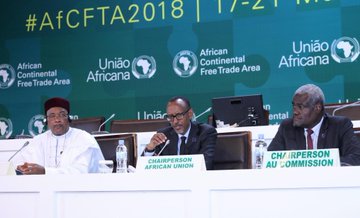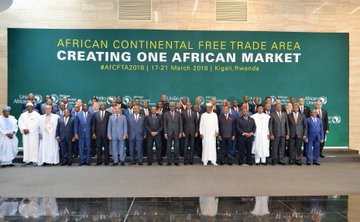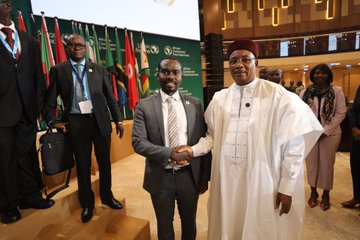
April 6, 2019//-Excitement was palpable throughout the region as the dream for a continental free trade area in Africa got the final ratification needed to become a reality on Monday.
Gambia became the 22nd African country to ratify the African Continental Free Trade Area agreement (AfCFTA), meaning the bill now has the minimum number of ratifications needed to come into effect.
On March 21 Ethiopia became one of the last African nations to ratify the AfCFTA, bringing the tally of endorsing countries to 21.
The trade bloc spanning 49 countries with a combined GDP of $3trn, will facilitate inter-regional trade, boost growth and help to alleviate poverty, its supporters say.
The news was tweeted by the African Union Commissioner for Trade and Industry Albert Muchanga:
“Good news! The Parliament of The Gambia has APPROVED ratification of #AfCFTA Agreement making us meet the minimum threshold.
“The AfCFTA market is being born and is one step ready for launch of its operational phase in July this year.
The agreement, signed by 49 of the 55 African Union nations in March last year, will dodge a patchwork of trade regulations and tariffs that make intra-African commerce costly, time-consuming and cumbersome.
Its promotion of tariff-free movement of goods, people and services across the continent is also expected to favour SME’s, who account for 80% of Africa’s employment and 50% of its GDP, according to the World Bank.
But skeptics have pointed to the impending challenges of uniting countries with the greatest level of income disparity between them, under the umbrella of one trade bloc.
For example, over 50 percent of Africa’s cumulative GDP is contributed by Egypt, Nigeria and South Africa, while Africa’s six sovereign island nations collectively contribute just 1 percent.
The motion was brought before Gambia’s parliament by Lamin Jobe, Gambia’s trade minister who highlighted the trade benefits of deeper regional integration:
“This document will definitely serve as a take-off point to enhance the free movement of people, good and services.
“By using this there is a lot of advantages that we can gain from the implementation of this agreement,” he said.
This article was originally published on africanbusinessmagazine.com.







